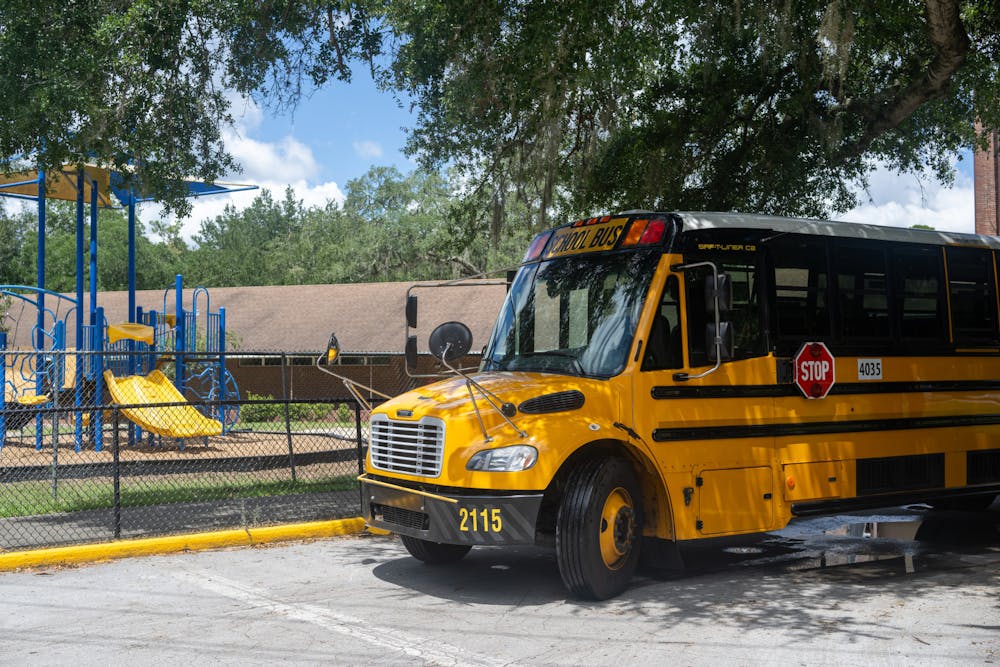It was a busy morning for Tawanna Sylvester.
She helped her two elementary school children climb into the car. As she drove down the road on her way to Carolyn Beatrice Parker Elementary, she saw several neighborhood kids walking to school. With their parents' permission, each began to join the car ride, she said.
“At the time we were passing them, there was no way they were going to make it to school on time,” Sylvester said. “My heart wouldn’t let me allow these kids to be walking.”
With no bus stop at her complex, the 46-year-old Gainesville resident seated up to 11 neighborhood children in her seven-seater car to help get students to school. Out of eight families with elementary school children in Sylvester’s complex, she’s one of only two with a car, she said.
According to state law, students will receive bus transportation if they live two or more miles away from school.
Oakview and Campus Walk, both low-income housing communities, are located just under two miles from the school. With no bus transportation, the average walking route to Parker from Oakview or Campus Walk is 33 minutes. Both walking routes must cross 13th Street, which is considered one of Gainesville’s most dangerous roads.
To accommodate families this school year, students in Campus Walk, Oakview and Corey Diamond Village will now be able to ride an existing bus to school. Stops have been added to accommodate this change, ACPS public information officer Jackie Johnson wrote in an email.
In Alachua County, parents have the opportunity to request transportation if their student’s walk to school meets the state’s definition of a hazardous walking condition. Parents and teachers raised concerns at an Alachua County School Board meeting Aug. 21.
The district regularly reviews requests for busing based on hazardous walking conditions that may exist on a student's route to school and will continue to do so, Johnson wrote.
About 45% of the cost of transporting students in ACPS is reimbursed by the state, but the state does not cover the cost of courtesy busing. ACPS spends $1.2 million annually for courtesy busing transportation, Johnson wrote.
For Sylvester, having kids walk isn’t just a safety concern, but also puts pressure on working families to sacrifice work hours to get their kids to school, she said.
“I know that there were other children whose parents may have been working overnight, and there was no one to take them to school,” she said. “Why would you take buses from these children and not know the situation they’re in?”
Jared Folds, a 40-year-old Gainesville resident, is the community director at the Residence at Oakview. For many low-income communities in Gainesville, he is the “focal point for community engagement and community partnerships,” he said.
“It’s not a courtesy per se when this is a necessity for some of our residents to get their kids to school and to be able to sustain their housing or to sustain their job and become self-sufficient,” he said. “Which is the ultimate goal for anyone that is overcoming barriers of living in an extremely low-income community.”
However, this wasn’t the first time transportation issues occurred. Courtesy buses originally stopped in early January due to driver shortages and lack of funding. Public outcry following the change allowed the buses to be reinstated for the rest of the 2023-24 school year, Folds said.
“It was never explained to me for our parents that it was a temporary fix,” he said.
Oakview and Campus Walk are predominantly African-American neighborhoods, according to census data.
By speaking with families every day, Folds found nearly half of African-American students and their families at Parker were impacted by the end of the courtesy routes.
As of the 2022-23 school year, about one-fifth of students at Parker Elementary are African American, according to the National Center for Education Statistics.
“This is what’s even more shocking to me,” he said. “That this inequity on this level would actually be something that just flew under the radar and it wasn’t already planned for.”
Before the start of the school year this fall, teachers and families didn’t know whether courtesy buses would remain.
Sherri Rupe, a first-grade teacher at Parker, shared her safety and performance concerns at the ACPS school board meeting Aug. 21, she said.
“It was crazy, that whole month of January,” she said. “So again [this school year], we went through this mass mess of parents trying to figure out how to get their kids to school.”
Rupe said the lack of permanent transportation had an impact on her students’ attendance and performance.
“I have a little girl who comes an hour late to school every day, and then she sits in the office waiting for a ride in the afternoon,” she said. “Kids would roll in tardy, they would miss breakfast [in the cafeteria] because they were late.”
Now that she’s seeing more faces in her classroom, Rupe said she’s happy the buses are back for now.
Contact Sara-James Ranta at sranta@alligator.org. Follow her on X @sarajamesranta.
Sara-James Ranta is a third-year journalism major, minoring in sociology of social justice and policy. Previously, she served as a general assignment reporter for The Alligator's university desk.






